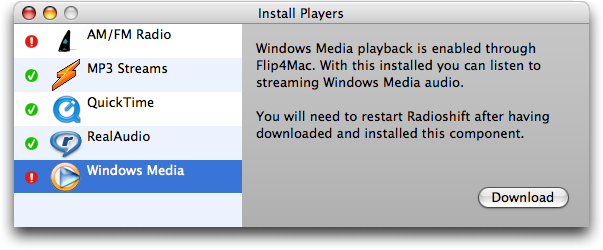

"After all," he wrote, "what could possibly compete against a game that is six years in the making, is called by the own company's president 'turtleware,' and has a release date that reads, 'when it's done'?" Reader Fabricio Rosas Tariki had a similar take, suggesting Duke Nukem Forever should be considered hors-concours. So, without further ado, the winners of Wired News' 2003 Vaporware Awards - in reverse order - are:Ī Lifetime Achievement Award goes to Duke Nukem Forever on the suggestion of reader Jeff White, who wrote, "First proposed in 1801 (or something close to that), Duke Nukem Forever has now come to define the term 'vaporware.' I wouldn't be surprised if dictionaries actually began printing it: 'vaporware: n. 4 last year and is now so vaporous that no one is looking forward to it anymore. Bush's weapons of mass destruction and the Oqo minicomputer, which came in at No.
#Griffin radioshark linux code
Meanwhile, dishonorable mentions go to SCO for the as-yet-unseen Unix code that the company alleges was ripped off in Linux, and to Microsoft for its "secure computing initiative" and the ever-slipping ship date for Longhorn, which is shaping up to be a very promising candidate for the Vaporware awards in 2006, 2007 and maybe even 2008.ĭishonorable shout outs also go to Valve's Counter-Strike: Condition Zero President George W. We'll see if it makes next year's Vaporware list.

The company started dropping "early 2004" hints only late last year when it began taking pre-orders. In what may prove an important lesson for the rest of the industry, ID has remained vague about its release schedule, a strategy that hasn't raised unrealistic expectations about when its titles will emerge. ID lost votes because it hasn't made any unrealistic promises about the title's launch date. Oddly, ID Software's Doom III didn't earn enough votes to propel it onto this year's list of shame, despite being one of the most anticipated games in recent memory.

This year that award goes to Duke Nukem Forever.

We created a new honor, the Lifetime Achievement Award. Use cp on /dev/dspx (x is a number) if OSS devices are used.However, rather than award 3D Realms the coveted Vaporware title for the third year in a row, we decided the company deserved something special. If arecord is not available then is likely ALSA is not installed. Once USB audio device is installed, check if you can you use arecord to copy the audio stream into a file. For ALSA check the directory /proc/asound. If OSS is installed then you will see new devices such as /dev/dsp0. You can test for the presence of an audio subsystem by plugging in some sort of audio source device such as USB microphone, USB audio adaptor, USB mic/Headphone set used for Skype etc. It is possible to get around this but you would need a good network to stream WAV. To encode a stream from WAV into Flac requires processor power and you have not specified the model - IIRC QNAP have NAS which have ARM processors ranging from about 250Mhz to 1.2Ghz. An audio subsystem such as OSS, ALSA or very unlikely Pulse is required.Ģ. There is only a small custom application to tune the Radioshark and this could be built for an ARM system assuming the right tools, libraries and kernel modules (for USB support) are available.ġ. I was looking at using a QNAP NAS as the centre of my media platform, since this runs on an ARM based Linux will the plugin even work? I just read your SharkPlay plugin thread, that is some great work there!


 0 kommentar(er)
0 kommentar(er)
